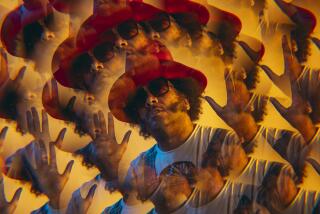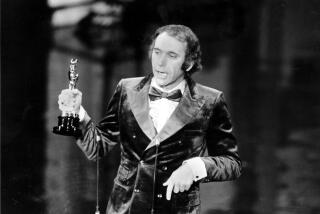A happy sort of angry
Aaron McGruder, the Artist Formerly Known as the Angriest Black Man in America, canât stop smiling. In fact, heâs busting up, bobbing and weaving as he reacts to the animation unfolding on his living room wall big screen. Itâs from the new season of âThe Boondocks,â the adaptation of his button-pushing hip-hop-flavored newspaper strip, centered on 10-year-old black militant Huey Freeman and his gangsta-wannabe younger brother Riley, who have to move from Chicago to live with their gruff grandfather in the suburbs.
The appearance of one of the showâs breakout characters, Uncle Ruckus, a foul-mouthed black man who hates black people, makes the slim, unassuming McGruder laugh so hard that his outburst fills the room in his hilly West Los Angeles home, even with the volume turned up to near ear-splitting levels. Heâs further amused by his cartoonâs caricatures of Larry King, Bill Cosby and pundit Ann Coulter.
A mash-up of in-your-face urban humor and Korean-drawn anime that became one of the flagships of the edgy Adult Swim late-night lineup on Cartoon Network, âThe Boondocksâ returns Oct. 8 for its second season after a roughly two-year break.
The first season lighted fuses even before its debut. The Rev. Al Sharpton and other black activists were angered by the showâs liberal use of the N-word, charging that the word is inappropriate for humor.
Since he launched the strip in 1999, âThe Boondocksâ has been an all-consuming passion that has taken McGruder to emotional peaks and troughs. But on this day, despite the frenzy of last-minute tinkering and adjustments, he seems at peace with himself and his creation.
âItâs just a much better show than last season,â he says, rubbing his hand through his closely cropped hair. âIt looks so much better, the performances are better, everything is just coming together. Itâs just so much more satisfying, and weâre much closer to the goal of what I think the show can be.â
But to reach this moment of contentment, McGruder, 33, decided that he needed to pay a heavy price -- giving up the vehicle that not only brought him national fame and celebrity but had been the driving force of his life since college. In order to be happier with âThe Boondocks -- The TV Show,â he had to let go of âThe Boondocks -- The Strip.â
He quit his daily satirical platform, which was syndicated in more than 300 newspapers nationwide, including the Los Angeles Times and the Washington Post. His abrupt and unexpected departure shocked fans, and McGruder had few explanations as he crept from public view, turning down invitations for talk shows and speaking engagements.
âI wanted to hang on to both, but ultimately I made the decision that the show could not be sacrificed,â McGruder says. âOnce I decided that, it was an easy decision, even if it cost me. I didnât want to do the strip badly and the show badly.â
McGruder is still haunted by the memories of bouncing between supervising a complex animated series and churning out a seven-day-a-week strip. The ordeal of juggling both gigs nearly crushed him. He was unhappy with the early storyboards and artwork on the series, and he was increasingly frustrated by the relentless delays, snafus and difficulties of working with an overseas studio. âThereâs only one word for that first season -- insanity,â he says. âIt was just a horrible situation. I hadnât worked one day of TV in my life, and all of a sudden Iâm running my own show. I didnât know when you work on an animated show that thereâs a crisis every week. Only the first year working on the strip alone was harder.â Whatâs more, McGruder admits heâs a lot less confrontational. âI was absolutely a [jerk]. There were certain things that I gave up -- patience, sleep. I was under so much pressure. I took myself too seriously.â
From this distance, heâs far from dissatisfied with the inaugural season -- the series represented the realization of a lifelong dream, and it earned solid ratings for Adult Swim -- the home of off-the-wall fare such as âRobot Chickenâ and âAqua Teen Hunger Forceâ -- and a fan base that hailed McGruder at last summerâs Comic-Con.
More significant, âThe Return of the King,â an episode about Dr. Martin Luther Kingâs reversal of his âturn the other cheekâ philosophy after awakening from a 32-year coma and witnessing bling-wearing rappers and raunchy images on BET, scored him a Peabody Award for âdistinguished achievement and meritorious service.â
Now, the cartoonist who once bragged about calling Secretary of State Condoleezza Rice a âmurdererâ to her face and who has taken on BET, the Bush administration and the Democratic Party, is emerging gradually from his self-imposed exile. Heâs still intensely private -- McGruder does not discuss his personal life, and donât expect to see him pop up on âThe Viewâ or other shows to promote his series. But his âdark sideâ has lightened up considerably in sync with his satisfaction over âThe Boondocks.â In addition to working with his team -- a dedicated collection of writers and artists who share his vision -- the key difference was giving up the strip. âIf I have achieved anything, itâs not so much financial independence but to give myself the opportunity to relax, to not stretch myself too thin,â he says. âIf Iâm happy, itâs because Iâm happy with the show. I was not cut out to be a cartoonist in a newspaper. Doing it on their terms was not working.â
Heâs also easier to work with. Regina King, who provides the voice of both Huey and Riley, says, âAaron is still stressed, but I think heâs a bit more comfortable with his ideas. He provokes thought without hitting people over the head.â
But those who think the return also marks the mellowing of Aaron McGruder had better think again. The 15 new episodes will continue to take caustic potshots at current events, rappers, race relations and the state of black popular culture. A stinging parody of âSoul Plane,â the much-criticized movie that features Snoop Dogg and MoâNique, is a highlight of the first installment. A rapper named Thugnificent moves into the neighborhood where the Freemans live and turns the suburban area upside down. Uncle Ruckus, who calls blacks âmonkeysâ and worse, gets his own reality show and will become even more vindictive against his race. Thereâs also an episode dealing with the aftermath of Hurricane Katrina.
And if Sharpton was upset over last seasonâs use of the N-word, he might consider polishing his marching shoes. It even gets its own episode: âThe N-Word,â in which it is uttered continuously.
Said Rodney Barnes, co-executive producer of âThe Boondocks: âYou canât bury [the N-word]. Itâs like a vampire. Itâs going to live forever. And we canât let the fans down. Why be responsible now?â
Addressing an overflow crowd of âThe Boondocksâ fans at Comic-Con, McGruder said he would be happy to march alongside Sharpton. âHis job is to get me thrown off the air, and I will try to help,â he quipped. âHeâs right. I must be stopped.â The hall filled with cheers.
Network and studio executives involved with âThe Boondocksâ show little concern about a potential âBoondocksâ controversy. âThat word is such a part of âThe Boondocks,â â said Adult Swim Senior Vice President Mike Lazzo. âI asked Aaron about it, and he said, âIâm making my show.â We heard all these things about how horrible it was before we put on âReturn of the King,â and then when I watched it, it was the greatest thing Iâve seen. I hear from our fans -- and theyâre very vocal fans -- and I have never heard that criticism.â
And Jeanie Bradley, executive vice president of current programming for Sony Pictures Television, which produces the series, says the visual and creative quality of the show should override reservations about its more pointed content: âItâs funnier than itâs ever been, and the rhythm is just so right. Aaron really has something to say, and heâs definitely found his groove.â
CONSIDERABLE UPSET
McGruderâs urge to use his âBoondocksâ characters to speak out about politics and culture has animated him since his days at the University of Maryland, when he first sent packages of the cartoon to various newspaper syndicates. The strip was a reflection of his affection for artists such as KRS-One and Public Enemy, who used rap to express their strong political views.
The strip made McGruder famous, and infamous. He turned up often on âReal Time With Bill Maherâ and other talk shows. His âBoondocksâ collections were bestsellers, and he was a popular speaker on college campuses. The NAACP gave him an Image Award.
He also caused considerable upset. The Washington Post once pulled a week of strips making fun of Rice and her love life. And a few papers yanked strips when he blasted the wave of patriotism after the start of the Iraq war.
Moving âThe Boondocksâ from the newspaper to the small screen has meant artistic sacrifices: The newspaper strip skewered daily events, while the targets of the series have to be much broader. And the show is aimed at a younger audience. Many of the showâs followers at Comic-Con, a racially diverse group composed mostly of fans in their 20s and 30s, seemed to be unaware that âThe Boondocksâ ever existed as a strip.
âI have to find out whatâs relevant in this audienceâs world, to find the balance between what I want to talk about and what they want to hear,â McGruder said.
He was determined to hang on to his daily strip even while taking on the rigors of the first season: âI just always thought of the strip as lifetime employment. It was too valuable a thing for me to give up. I just couldnât walk away from something that was so incredibly hard to get.â But continuing with the daily âBoondocksâ meant taking precious time away from the series, which was encountering numerous hurdles. Said McGruder: âI had neither the time or the interest to follow the news in great detail like I have to do when dealing with the strip. Plus, I see the demise of newspapers, the erosion of circulation, and I thought, âIs this really a secure job? Comics may not last forever.â â
And doing the strip stopped being fun. âAfter the reelection of Bush, I knew everything that was going to happen. And I wasnât the only one saying it. It was getting old.â
He is looking forward to continuing the series past its second season, and heâs even contemplating life beyond âThe Boondocks.â Heâs written a movie, saying only that itâs a comedy. And there are preliminary plans for a âBoondocksâ movie.
Huey and Riley might even wind up in a future version of a âBoondocksâ strip. âI can go back and do the strip whenever I want to,â he says. âNow I could go online, go wireless. Thereâs a whole [new] distribution out there. So itâs not necessarily gone.â
As he enters his new phase, the Artist Formerly Known as the Angriest Black Man in America has no regrets over his often explosive past and interactions. âIt was time to do those things. Some . . . needed to be said. I donât feel bad about any of it. Iâm just glad I donât have to be that guy anymore.â
--
More to Read
The complete guide to home viewing
Get Screen Gab for everything about the TV shows and streaming movies everyoneâs talking about.
You may occasionally receive promotional content from the Los Angeles Times.







